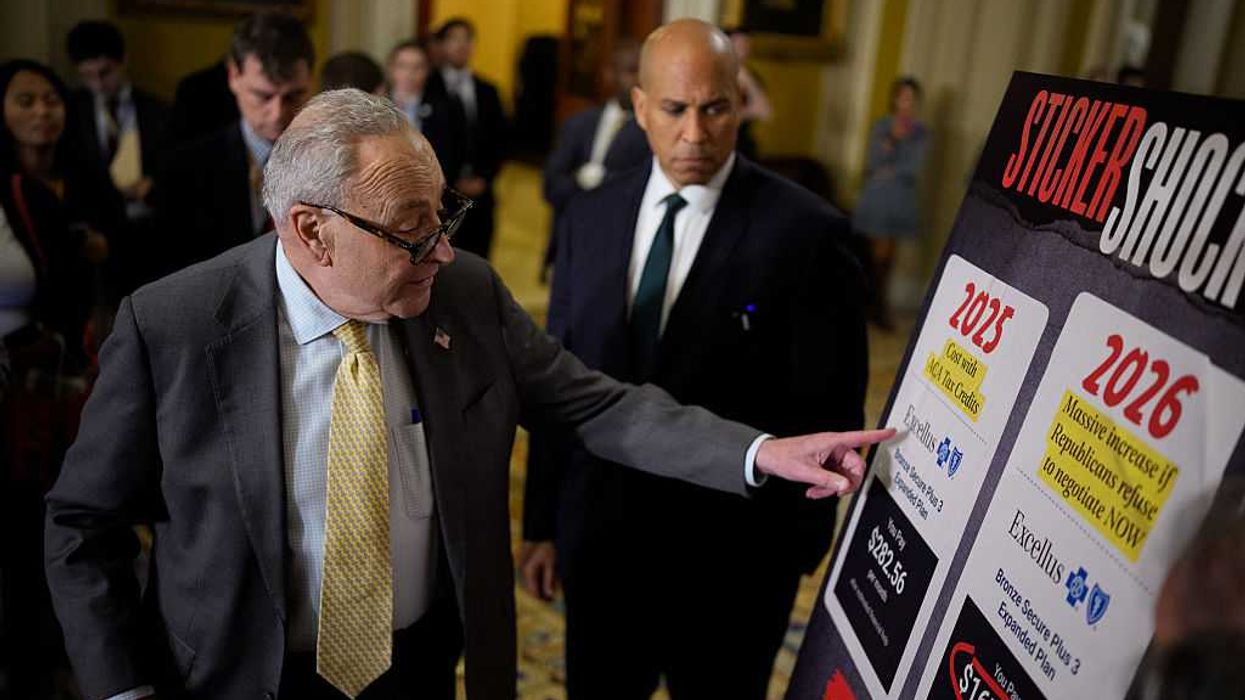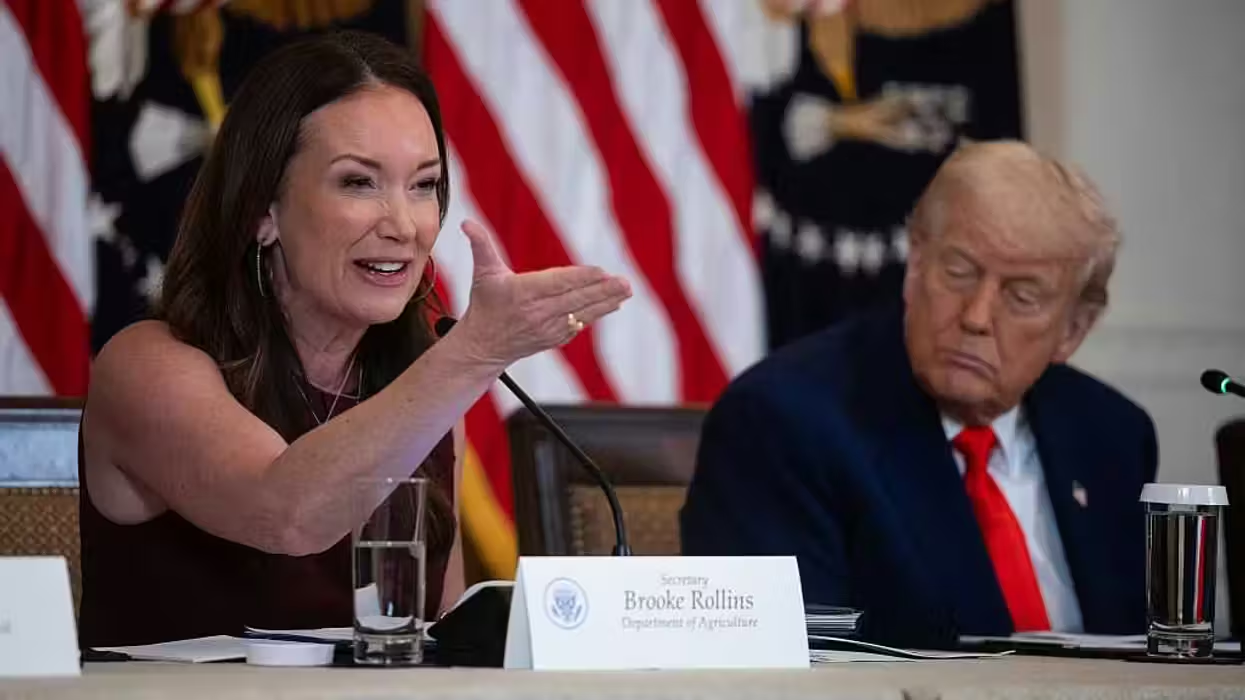
© 2025 Blaze Media LLC. All rights reserved.
UPDATED: Republican Leaders Propose Official 'Fiscal Cliff' Counteroffer
December 03, 2012
A “good-faith effort to find common ground.” -- UPDATED: White House rejects
House Republican leaders on Monday countered President Barack Obama’s opening “fiscal cliff” offer with a proposal to produce $2.2 trillion in budget savings over the coming decade with “a combination of spending cuts, entitlement reforms, and $800 billion in new tax revenue,” The Hill reports.
The $800 billion in tax revenue would be achieved through closing loopholes and deductions while lowering rates.
The counteroffer was delivered to the White House via a three-page letter signed by Speaker John Boehner (R-Ohio), Majority Leader Eric Cantor (R-Va.), and other senior Republicans, including former Romney running mate Rep. Paul Ryan (R-Wis.).
The GOP letter begins by outright rejecting the president’s initial offer, which included a $1.6 trillion tax increase (twice the amount he supported during the 2012 presidential election), a $50 billion economic-stimulus program, and the removal of the federal debt limit, as outlined by Treasury Secretary Timothy Geithner.
“[T]he proposal [Secretary Geithner] outlined on behalf of your Administration contains very little in the way of common ground,” the letter reads. “We cannot in good conscience agree to this approach, which is neither balanced nor realistic.”
The letter goes on to offer the House-passed Budget Resolution as a possible compromise.
“It assumes an overhaul of our tax code with revenue remaining at historically normal levels and proposes structural reforms to preserve and protect the Nation's entitlement programs,” the letter reads, “ensuring they are sustainable for the long-term rather than continuing to grow out of control.”
Here are some of the reforms included in the resolution:
The House-passed Budget Resolution assumes enactment of structural Medicare reform that offers future beneficiaries guaranteed coverage options, including a traditional fee-for-service Medicare plan. This proposal is based on recent bipartisan efforts and would provide greater support for the poor and the sick and less support for the wealthy. We achieve these reforms in Medicare without affecting current seniors or those nearing retirement. This would slow the projected explosive spending growth in this program and eventually maintain Medicare spending as a share of the economy at 4.75 percent, thus saving the program for future generations.The House-passed Budget Resolution reforms Medicaid and provides states with greater flexibility to better deliver health security to beneficiaries, saving the federal government nearly $800 billion over 10 years.
Separate from savings in our proposal for the 2010 health care law, the House-passed Budget Resolution envisions hundreds of billions in savings in other mandatory spending, including reforms to Federal employee compensation and the Supplemental Nutrition Assistance Program.
Notably absent from Republican's counteroffer is a proposal to increase the debt ceiling limit.
The letter also supports the “middle ground approach” proposed last year by Erskine Bowles, the former chief of staff to President Clinton, before the congressional “supercommittee” on deficit reduction (this proposal is different from much-lauded “Simpson-Bowels” proposal).
“[Bowles] recommended that both parties agree to a balanced package that includes significant spending cuts as well as $800 billion in new revenue,” the letter reads.
“Notably, the new revenue in the Bowles plan would not be achieved through higher tax rates, which we continue to oppose and will not agree to in order to protect small businesses and our economy. Instead, new revenue would be generated through pro-growth tax reform that closes special-interest loopholes and deductions while lowering rates,” the letter adds.
The Bowles recommendation calls for cuts amounting to more than $900 billion in mandatory spending and cuts of about $300 billion in discretionary spending.
“These cuts would be over and above the spending reductions enacted in the Budget Control Act,” the letter continued.
“This is by no means an adequate long-term solution, as resolving our long-term fiscal crisis will require fundamental entitlement reform. Indeed, the Bowles plan is exactly the kind of imperfect, but fair middle ground that allows us to avert the fiscal cliff without hurting our economy and destroying jobs,” the letter says.
Senate Minority Leader Mitch McConnell (R-Ky.) called the Republican proposal a “good-faith effort to find common ground.”
“While the president hasn’t moved an inch away from his efforts to please his radical left-wing base, the Speaker has consistently shown a good-faith effort to find common ground and a realistic approach to solving the very real economic problems facing our country,” said Sen. McConnell.
“If the president is serious about joining us in an effort to reduce the deficit and protect the economy, he’ll get off the campaign trail, drop the left-wing talking points, and instruct his staff to negotiate a solution in good faith based on actual written proposals. In short, he'll begin doing what leaders do: Lead," he added.
Here’s the full letter:
GOP Letter to WH
For its part, the White House insists President Obama won't agree to any deal that "fails to increase tax rates on upper-income earners," the Associated Press notes.
UPDATE: White House Communications Director Dan Pfeiffer on Monday rejected the Republican's counteroffer, arguing that the approach was not "balanced."
“The Republican letter released today does not meet the test of balance," Pfeiffer said, according to BuzzFeed. "In fact, it actually promises to lower rates for the wealthy and sticks the middle class with the bill. Their plan includes nothing new and provides no details on which deductions they would eliminate, which loopholes they will close or which Medicare savings they would achieve."
He continued:
Independent analysts who have looked at plans like this one have concluded that middle class taxes will have to go up to pay for lower rates for millionaires and billionaires. While the President is willing to compromise to get a significant, balanced deal and believes that compromise is readily available to Congress, he is not willing to compromise on the principles of fairness and balance that include asking the wealthiest to pay higher rates. President Obama believes – and the American people agree – that the economy works best when it is grown from the middle out, not from the top down. Until the Republicans in Congress are willing to get serious about asking the wealthiest to pay slightly higher tax rates, we won’t be able to achieve a significant, balanced approach to reduce our deficit our nation needs.
Boehner spokesman Brendan Buck voiced the Speaker's frustration with lack of progress being made in negotiations.
“Republicans have once again offered a responsible, balanced plan to avoid the 'fiscal cliff,' and the White House has once again demonstrated how unreasonable it has become," he said, "If the President is rejecting this middle ground offer, it is now his obligation to present a plan that can pass both chambers of Congress.”
The ball is now in the White House's court.
Follow Becket Adams (@BecketAdams) on Twitter
Featured image courtesy Getty Images.
Want to leave a tip?
We answer to you. Help keep our content free of advertisers and big tech censorship by leaving a tip today.
Want to join the conversation?
Already a subscriber?
more stories
Sign up for the Blaze newsletter
By signing up, you agree to our Privacy Policy and Terms of Use, and agree to receive content that may sometimes include advertisements. You may opt out at any time.
Related Content
© 2025 Blaze Media LLC. All rights reserved.
Get the stories that matter most delivered directly to your inbox.
By signing up, you agree to our Privacy Policy and Terms of Use, and agree to receive content that may sometimes include advertisements. You may opt out at any time.





